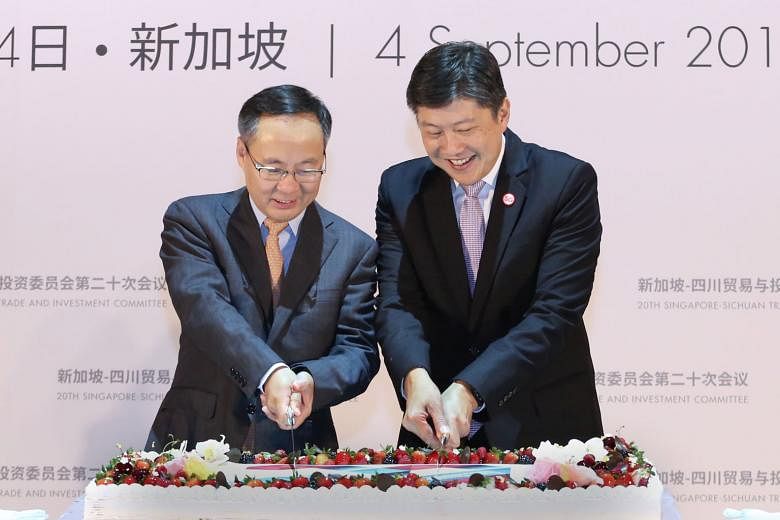Despite uncertain global economic conditions last year, trade between Singapore and China's Sichuan province grew 42.8 per cent year on year to US$1.44 billion (S$2 billion).
In the first half of this year, the growth figure was even higher at 50.3 per cent compared with a year ago, said leaders at the 20th Singapore-Sichuan Trade and Investment Committee meeting in the Shangri-La Hotel yesterday.
A large part of this growth stems from the "immense potential" in Sichuan and Asean, said Minister in the Prime Minister's Office Ng Chee Meng on the sidelines of the event.
"The market in China developed earlier in the coastal areas. In the western area now, Chengdu, Sichuan, is really the economic engine," he said, referring to the capital of the south-western province.
Sichuan recognises that there are opportunities for its firms to use Singapore as a springboard to Asean as well, accounting for a large part of the growth, said Mr Ng.
He added in an opening address that Singapore remained the largest foreign investor in Sichuan last year.
Its cumulative investments there were almost US$7 billion last year, in over 600 projects ranging from infrastructure to modern services.
Both sides continue to deepen collaboration, with 17 project agreements signed yesterday in areas ranging from medical technology to transport and logistics.
Among them, Singapore biomedical start-up Innovfusion signed a research collaboration agreement with the West China Hospital of Sichuan University to co-develop a smart system for administering general anaesthesia.
-
17 agreements inked at S'pore-Sichuan meet
-
Patients undergoing general surgery in China could have their blood pressure managed by a smart system if a collaboration between a Singapore biomedical start-up and hospital in western China comes to fruition.
The aim is to automatically manage a patient's blood pressure, giving each person the precise amount of medication they need during anaesthesia care.
Start-up Innovfusion and the West China Hospital of Sichuan University signed a research collaboration agreement yesterday at the 20th Singapore-Sichuan Trade and Investment Committee meeting to develop such a system. It was one of 17 agreements inked at the meeting, and among the first biomedical technology partnerships between Singapore and Sichuan.
There are around 55 million general surgery operations undertaken in China a year and about 300 a day at the West China Hospital, said Innovfusion chief executive Gabriel Tan. "What (China is) faced with is a very acute shortage of skilled anaesthesiologists, yet an insatiable need for good... operative care. The goal of this system is to be able to work with anaesthesiologists ... for them to be able to personalise their care," he said.
A similar system is already on trial at KK Women's and Children's Hospital for cesarean surgery. Its chief executive Alex Sia is an Innovfusion co-founder.
Mr Tan said it is unclear when the system will be rolled out in China.
Five of the 17 agreements signed yesterday involved companies setting up in the Singapore Innovation Centre, a launchpad for local firms to enter Sichuan. They include Ademco Security Group, clean energy start-up Aspiring Citizens Cleantech and tech and consulting company Innowave Tech.
Ademco is setting up its west China headquarters in the innovation centre, with group managing director Toby Koh citing the importance of being plugged into an ecosystem that has the right talent.
Apart from using the innovation centre as a base to collaborate on new solutions, such as those involving blockchain, Mr Koh believes Singapore firms can help Chinese companies commercialise their technology internationally.
Seow Bei Yi
Ademco Security Group and clean energy start-up Aspiring Citizens CleanTech also signed memoranda of understanding to set up operations in the Singapore Innovation Centre, a launchpad for Singapore firms to enter Sichuan.
They plan to provide smart security and transport solutions, respectively.
At the event, Sichuan vice-governor Li Yunze said the innovation centre is expected to formally start operations in November, with about 10 projects coming on board.
Looking ahead, Mr Ng said there remain many areas where both sides can forge closer partnerships, including in innovation and entrepreneurship, as well as in the internationalisation of Chinese firms.
"As we tackle common challenges such as providing affordable healthcare and an ageing population, there is potential for both sides to co-create innovative solutions," he said, adding that Singapore can also share its experience in tourism to contribute to Chengdu's vision of becoming a global city.
"Sichuan and Singapore companies can also tap each other's complementary strengths to explore partnerships in third-party markets," he said.
Both sides should continue to foster close exchanges as well, especially among youth.
Last year, Enterprise Singapore led over 80 local companies across the food, education and eldercare sectors to explore business opportunities in Sichuan.
He noted that small and medium-sized enterprises play an important role in both Sichuan and Singapore's economies, urging more Sichuan firms to use Singapore to expand to South-east Asia and beyond.
"Sichuan companies are strong in construction, engineering, and have significant financial, human and technological resources," he said.
"Singapore companies have strong networks in the region, complementary strengths in urban solutions, transport and logistics, and modern services.
"They are also more culturally in tune with South-east Asia countries and can help Sichuan partners navigate the local environment."


